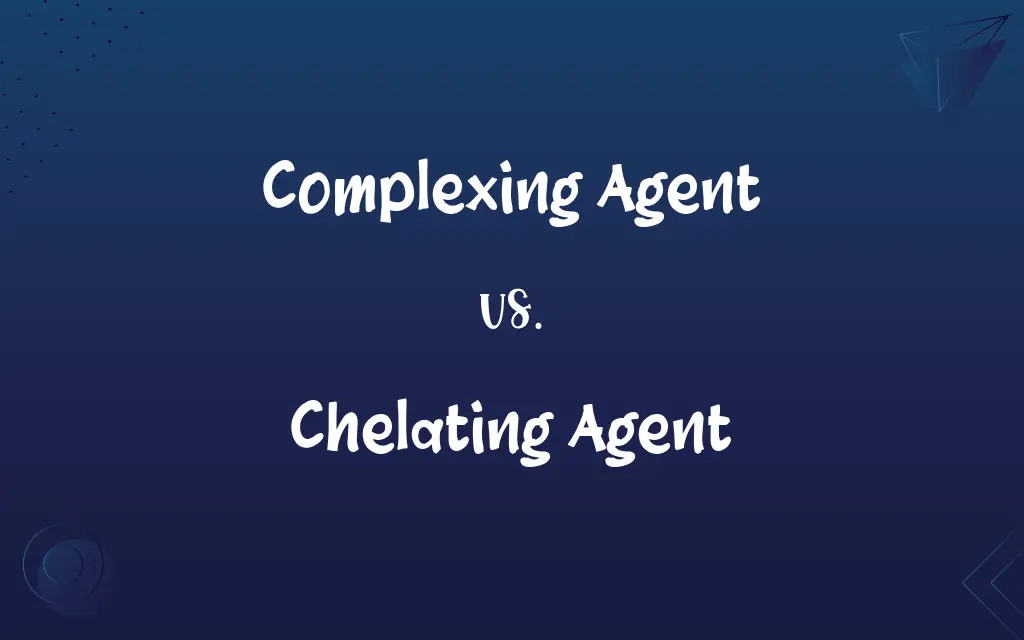Complexing Agent vs. Chelating Agent: Know the Difference

By Shumaila Saeed || Published on January 7, 2024
Complexing Agent is a substance that forms a complex with another. Chelating Agent is a complexing agent that binds tightly by forming multiple bonds.

Key Differences
A Complexing Agent is a substance that combines with another to form a complex, a structure where the agent is loosely associated with the other molecule or ion. Conversely, a Chelating Agent is a specific type of complexing agent that forms more stable and tightly bound complexes, often by wrapping around the central atom and attaching at multiple points.
Shumaila Saeed
Jan 07, 2024
Complexing Agents are versatile in their binding abilities, forming complexes with a variety of molecules or ions. These agents can interact through several modes, such as electrostatic interactions or coordinate covalent bonds. Chelating Agents, however, are known for their claw-like action, where they "chelate" or grab the central atom, forming multiple bonds that result in a ring-like structure.
Shumaila Saeed
Jan 07, 2024
In chemistry, Complexing Agents play a crucial role in stabilizing ions or molecules, but their complexes are usually less specific and can be reversible. In contrast, Chelating Agents are often used for their ability to form strong and specific complexes, which is critical in applications like metal ion sequestration in medicinal chemistry.
Shumaila Saeed
Jan 07, 2024
The stability of the complexes formed is a key difference. Complexing Agents often form less stable and easily dissociable complexes. In contrast, Chelating Agents, because of their multiple attachment points, form more stable and enduring complexes, making them ideal for applications requiring strong and lasting interactions.
Shumaila Saeed
Jan 07, 2024
In summary, while all Chelating Agents are Complexing Agents, not all complexing agents have the chelating ability. The latter's unique multi-point binding mechanism sets them apart, offering higher stability and specificity in complex formation.
Shumaila Saeed
Jan 07, 2024
ADVERTISEMENT
Comparison Chart
Binding Method
Forms complexes through various binding modes.
Binds by forming multiple coordinate bonds.
Shumaila Saeed
Jan 07, 2024
Stability
Generally forms less stable complexes.
Creates more stable complexes.
Shumaila Saeed
Jan 07, 2024
Specificity
Less specific in binding.
Highly specific due to multi-point attachment.
Shumaila Saeed
Jan 07, 2024
Structure
Does not necessarily form a ring structure.
Often forms a ring structure around the central atom.
Shumaila Saeed
Jan 07, 2024
Applications
Broad, in various fields of chemistry.
Focused, often in metal ion sequestration and medicinal chemistry.
Shumaila Saeed
Jan 07, 2024
ADVERTISEMENT
Complexing Agent and Chelating Agent Definitions
Complexing Agent
An agent that associates with other substances to form a composite.
In water treatment, certain polymers serve as complexing agents to remove contaminants.
Shumaila Saeed
Dec 28, 2023
Chelating Agent
A substance that binds tightly to ions, often in a ring-like fashion.
The chelating agent effectively removed the excess iron from the solution.
Shumaila Saeed
Dec 28, 2023
Complexing Agent
A molecule that temporarily associates with others, forming a larger entity.
In the biochemical assay, a complexing agent was used to enhance the visibility of the target protein.
Shumaila Saeed
Dec 28, 2023
Chelating Agent
A chemical that forms stable complexes with metals.
The soil's high concentration of chelating agents affected the availability of micronutrients.
Shumaila Saeed
Dec 28, 2023
Complexing Agent
A chemical that can form reversible complexes.
The complexing agent in the solution stabilized the metal ions during the reaction.
Shumaila Saeed
Dec 28, 2023
ADVERTISEMENT
Chelating Agent
A molecule that forms several bonds with a single metal ion.
EDTA, a common chelating agent, is used to treat heavy metal poisoning.
Shumaila Saeed
Dec 28, 2023
Complexing Agent
A substance that forms a complex with ions or molecules.
EDTA acts as a complexing agent in binding calcium ions.
Shumaila Saeed
Dec 28, 2023
Chelating Agent
An agent used to sequester metal ions in various processes.
Chelating agents are essential in water softening to bind calcium and magnesium ions.
Shumaila Saeed
Dec 28, 2023
Complexing Agent
A substance that aids in the formation of a complex without permanent bonding.
A complexing agent was added to the experiment to observe the transient interactions.
Shumaila Saeed
Dec 28, 2023
Chelating Agent
A compound that captures ions through multiple attachment points.
In the chemical reaction, the chelating agent stabilized the copper ions.
Shumaila Saeed
Dec 28, 2023
Repeatedly Asked Queries
Can all complexing agents chelate?
No, only specific ones with multi-point binding capabilities.
Shumaila Saeed
Jan 07, 2024
What is a complexing agent?
A substance that forms complexes with ions or molecules.
Shumaila Saeed
Jan 07, 2024
How do complexing agents work?
They associate with other substances to form a composite structure.
Shumaila Saeed
Jan 07, 2024
Are complexing agents used in industry?
Yes, in various applications including water treatment and metal processing.
Shumaila Saeed
Jan 07, 2024
Are the complexes formed by complexing agents always stable?
Not necessarily; they can range from weak to strong.
Shumaila Saeed
Jan 07, 2024
How do chelating agents aid in water softening?
They bind to calcium and magnesium ions, preventing scale formation.
Shumaila Saeed
Jan 07, 2024
What is an example of a natural chelating agent?
Citric acid is a common natural chelating agent.
Shumaila Saeed
Jan 07, 2024
What is a chelating agent?
A complexing agent that binds to a central atom at multiple points.
Shumaila Saeed
Jan 07, 2024
What makes chelating agents unique?
Their ability to form stable, ring-like complexes.
Shumaila Saeed
Jan 07, 2024
Do chelating agents have medical uses?
Yes, in treating heavy metal poisoning and in certain diagnostic procedures.
Shumaila Saeed
Jan 07, 2024
Can complexing agents be used in food processing?
Yes, some are approved for use in food preservation and enhancement.
Shumaila Saeed
Jan 07, 2024
Are there any health risks associated with chelating agents?
If misused, they can disrupt essential metal ion balances in the body.
Shumaila Saeed
Jan 07, 2024
What are common examples of chelating agents?
EDTA and DTPA are well-known examples.
Shumaila Saeed
Jan 07, 2024
Do chelating agents have environmental concerns?
Yes, their persistence and toxicity can pose risks to ecosystems.
Shumaila Saeed
Jan 07, 2024
What role do chelating agents play in the environment?
They can affect the bioavailability of metals in soil and water.
Shumaila Saeed
Jan 07, 2024
Can chelating agents remove heavy metals from the body?
Yes, they are used in therapies to treat heavy metal toxicity.
Shumaila Saeed
Jan 07, 2024
Can complexing agents be synthetic?
Yes, many are synthetically produced for specific purposes.
Shumaila Saeed
Jan 07, 2024
Are chelating agents biodegradable?
It varies; some are biodegradable, while others are not.
Shumaila Saeed
Jan 07, 2024
How are complexing agents used in analytical chemistry?
They help in stabilizing ions for accurate measurements and analyses.
Shumaila Saeed
Jan 07, 2024
Are there alternatives to synthetic chelating agents?
Yes, natural chelators and newer biodegradable synthetic agents are being developed.
Shumaila Saeed
Jan 07, 2024
Share this page
Link for your blog / website
HTML
Link to share via messenger
About Author
Written by
Shumaila SaeedShumaila Saeed, an expert content creator with 6 years of experience, specializes in distilling complex topics into easily digestible comparisons, shining a light on the nuances that both inform and educate readers with clarity and accuracy.









































































